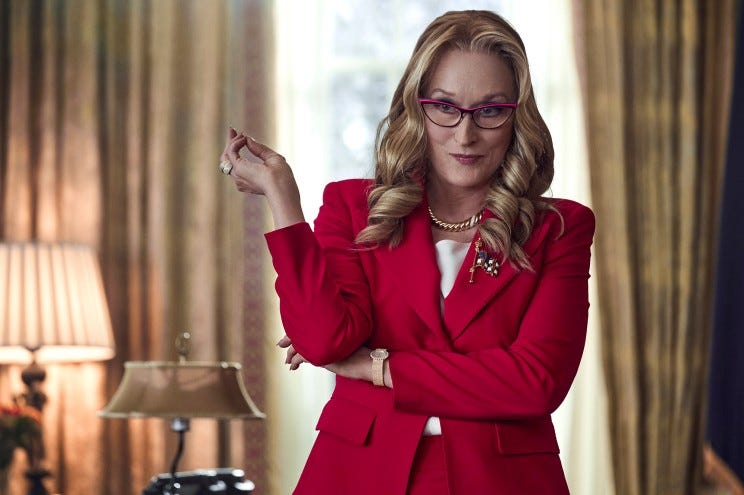When I started The Green Dispatch, I did not intend to write movie reviews, and this post really isn’t a review. Watching Don’t Look Up affected me deeply, and, as a frequent topic of this publication, global warming, is the subtext of the film, I thought it appropriate to give my thoughts on this movie. And it is not that big a stretch for me to write about a movie. Most of my early published pieces were on music and the arts.
I realize I’m a little late in having anything to say about the film, but I just saw it this last weekend,
I can’t tell you much about Don’t Look Up that you haven’t already read or heard about this bitingly satirical movie. The majority of critics have said that this film, written by Adam McKay and David Sirota and directed by McKay, is unfunny. They are wrong, it is. The satire is broad, with some of the biggest belly laughs coming from the characters’ unexpected foibles: the cheap grifting of a military general, or an unqualified NASA director admitting she dated a batshit crazy military colonel.
Don’t Look Up may remind viewers of McKay’s The Big Short. The 2015 movie recounts the lead up to the financial crisis of 2008. Both movies depict approaching catastrophes through the eyes of individuals who see the disasters coming.
The movie trope upon which Don’t Look Up might have relied is the one in which thinking and reason are challenged by superstition and ignorance. This trope lies at the foundation of a gazillion science fiction movies. Their message is usually pretty clear. Disaster will be avoided once we gain enlightenment and allow our lives to be guided by reason and science.
It would be easy to assume that Don’t Look Up would repeat this trope. After all, astronomers—rational, science-oriented individuals—are the ones who are warning of the comet and the cataclysm that await earth. Yet it becomes abundantly clear within a few opening scenes that the conflict at the heart of this movie is between people who have the ability to care and those who don’t. Dr Mindy (Leonardo DiCaprio) and the Ph.D. candidate Kate Dibiasky (Jennifer Lawrence) are certainly smart, but they are the ones in the movie who care for more than personal gain or vanity.
Perhaps this is the reason many critics find the movie unfunny. Jokes that poke fun at the usual targets are missing. Nobody is really dumb in this movie. They may pretend to be, but they aren’t dumb. President Orlean (Meryl Streep) is shallow, but she is nonetheless politically shrewd. Morning talk show host Brie Evantee (Cate Blanchett) plays the part of a bubble-headed blonde, yet she’s proud of her advanced education. No fun is poked at the most common target of satire, religious zealots. There aren’t any in this movie.

Don’t Look Up is unsubtle in its humor. And it is unsubtle in calling its audience to care. Throughout the searing comedy, amid the vanity and shortsightedness, there are sudden breakaway scenes of great beauty: hummingbirds, lizards, forests, temples, even microscopic organisms. The effect is jarring and to a degree epiphanic. With these breakaways, Don’t Look Up is prompting us to wonder at the world and to care.
These images lie in contrast to the one touted by the billionaire tech wunderkind Peter Isherwell (Mark Rylance), who praises a mawkish video of a puppy riding a chicken, because of its ability to distract us from our sadness. Isherwell, as well as the rest of big business, politics, and the press, want to distract us from what makes us upset or sad, because if we think about what made us sad—low wages, environmental destruction, ineffective politicians, etc.—it would threaten Isherwood’s billions, Evantee’s ratings, and President Orlean’s prospects for reelection.
Isherwood and his company, BASH (as in bash the planet), profane one of the greatest artistic icons of Christendom, Michelangelo’s rendering of God breathing life into Adam, to promote their latest gadget. This is in artistic and spiritual contrast to the sublime cutaway scenes of temples and religious rituals.
Dark comedies are not known for this level of depth. Tender or beautiful scenes are absent Dr. Strangelove. Paddy Chayefsky’s Network has no scenes of saving grace. In another Hollywood movie, any attempt at venturing into something deeper would have been depicted by one of the lead characters stopping to appreciate the beauty of a flower or the playfulness of a toddler. The cutaway scenes in Don’t Look Up eschew such sentimentality.
I’ve read that climate activists and scientists find the humor in the movie, but I think that anybody who has tried to keep bulldozers and concrete from overwhelming any part of nature will understand the humor. People who live in Flint, Michigan, should get the jokes. West Virginians who live among the mountaintop removal mines should laugh as much as I did. The same can be said of the folks at Standing Rock, too. I could name lots more.
And this movie is understood by everyone who knows that the door to the mayor, governor, or president was shut, is shut, and will remain shut, even though they have been allowed into the room.
I’ll be getting back to environmental news later this week. For more news follow me on Twitter @EcoScripsit.




